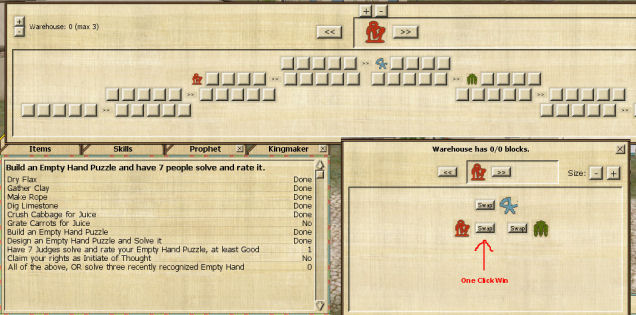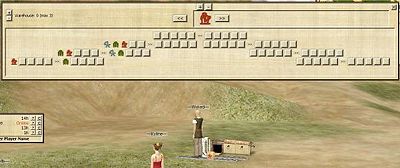The Wiki for Tale 5 is in read-only mode and is available for archival and reference purposes only. Please visit the current Tale 11 Wiki in the meantime.
If you have any issues with this Wiki, please post in #wiki-editing on Discord or contact Brad in-game.
Principles of Thought
| Discipline | ||
|---|---|---|
| Requirements | ||
| ||
| Principles | ||
| ||
| Demonstrated by Arame in Sterope on 2010-08-12. | ||
Build an Empty Hand puzzle and have 7 people solve and rate it.
Once you pass the principle, you will gain a level and will also be able to sign up for the seven Tests of the Thought discipline (provided that you meet the level requirements).
Base Cost
Empty Hand Puzzle
- 20 Dried Flax for stuffing Blocks
- 25 Thorns for Block Separators
- 80 Clay for Base
- 50 Boards for Holding Area
- 60 Limestone for extra Block weight
- 30 Rope for Mechanism
Built in a Small Construction Site (4 Rope, 1 Canvas).
Requires at least 3 blocks to function.
Each Block Added
- 7 Cabbage Juice (for Coloring Purple Face)
- 7 Dirt (for Coloring Red Face)
- 7 Limestone (for Coloring Light Face)
- 7 Clay (for Coloring Brown Face)
- 7 Carrot Juice (for Coloring Orange Face)
- 7 Grass (for Coloring Green Face)
- 1 Canvas (for Cushioning)
- Note:
- You will also need to add at least three blocks to the puzzle to make it work. WARNING after 8 blocks it started requiring a Gearbox! -Mystraca 1600 est Dec 19 2008
Total Materials for Puzzle with 3 Blocks
This is what you need to have to build the minimum empty puzzle with 3 blocks. Includes the materials for the Base Puzzle and for the 3 extra blocks. This also includes the 1 canvas and 4 ropes for Small Construction Site.
- 20 Dried Flax
- 25 Thorns
- 101 Clay
- 50 Boards
- 81 Limestone
- 21 Dirt
- 34 Rope
- 4 Canvas
- 21 Cabbage Juice
- 21 Carrot Juice
- 21 Grass
Designing
You have several areas to map. At the top left is your warehouse. This will hold extra blocks that could be used later in play. The top middle is your starting block(s). The open middle play-field is what transitions are allowed. Each section (boxes)>>(boxes) is a separate transition. The block color coding on the left can be turned into the color coding on the right.
Playing
The goal of playing an Empty Hand puzzle is to...well, empty your hand by removing all of the blocks. The game is composed of a system of rules which allow changing a particular pattern of blocks into other patterns of blocks. The ultimate goal is to play a rule that turns all of the blocks into 'nothing' by creating the pattern that allows the rule to be used.
For example, if the blocks are Red, Green, Blue and there is a rule to turn Green, Green, Blue into nothing, you would want to first play a rule that changes Red, Green into Green, Green. This would then create the appropriate condition to play the other rule, allowing you to win the puzzle.
This all becomes much more clear when you watch the animation of what's actually happening on the puzzle machine when you play the rules.
3 Block Puzzle with One Click Win

Note that some people will rate such a trivial puzzle poorly. If your aim is just to pass Principles, you should consider solving three recently recognized puzzles instead. You can use the Test Pass History to help you find them.
Beginner’s Guide to Solving an Empty Hand Puzzle
(I myself am still a beginner at Empty Hand puzzles, but I thought I'd try writing a clearer explanation of the rules. If you see anything that needs changing, please feel free to edit. -Pitaboo)
Goal: to move the blocks (colored shapes) in the top row out of your hand by using the swap options shown in the swapping area.
Warehouse: The top line reads “Blocks in your Warehouse 0/0.” For the simple puzzles, this line may never change. In the more complicated puzzles, some swaps send blocks to your warehouse. You may use these blocks in later moves.
Hand: The next row is your hand. It consists of several blocks of different shapes and colors. These are the blocks you need to trade out, or empty, by using the given swap options in the large box below. To the left and right of the blocks are moving arrows. By clicking on these arrows, you can slide the blocks left or right to position your hand so you can match sections of your hand to the swap options below in the swap area.
Swap Area: This is the largest field on the play menu. It consists of several swapping options, arranged in a vaguely pyramid-type layout. Each option shows a set of blocks on the left of a Swap Button followed by a different set of blocks on the right. When you match part of your hand to the appropriate swap option (matching set of blocks to the left of the Swap Button) in the Swap Area, you may swap those blocks for the new option (new set of blocks to the right of the Swap Button). You will notice that by clicking the left and right arrow buttons in your hand, these swap options will either be brightly colored, indicating that they are possible swap options, or switch to a duller color, indicating that you cannot perform that swap.
Emptying Your Hand: At least one of the swap options should include an exchange that allows you to swap a set of blocks for no blocks. By repeatedly arranging your blocks so that you can use that swap, you will be able to empty your hand and claim a win.
Also see this Empty Hand Puzzle Solving Guide.
Claim your Rights as Initiate of Thought
Once your puzzle has been judged at least 'good' by 7 people you must claim your rights. Do this by clicking on your puzzle and then "Claim Principles Advancement."
Recognized Empty Hand Puzzles
As puzzles are recognized in Sunday Passes, please add it to the following page.
For getting Principle by playing recently recognized EHP, the EHP must have won in the last 60 days!
Recognized Empty Hand Puzzles By Region (Doesn't appear to be actively maintained)
Semi-automatic Recognized Puzzles list (Doesn't appear to be actively maintained)
See also Test Pass History for full history including recent recognized puzzles.
